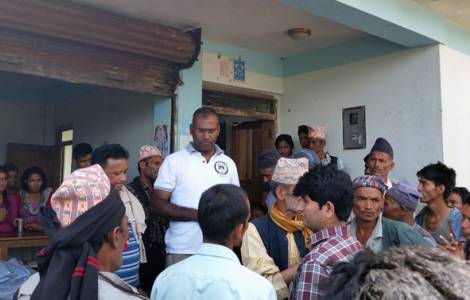
Kathmandu (Agenzia Fides) - Peace, stability, freedom, human rights, secularism of the state; but also committment in social service and education: these are the themes on which the Catholic Church in Nepal "will continue to contribute in its service to the country", says to Fides Fr. G. William Robins, Japanese-Canadian Jesuit who spent about 45 years in southern Asia, first with the Jesuits in Eastern Bhutan (five years) and then Nepal, mainly teaching maths and science at a high school. The Jesuit speaks to Fides of the current situation in the nation which on May 14 saw the population vote in the first phase of the administrative elections. This is the first local election after 20 years, a key step in building democracy ten years after the end of the civil war and two years after the Constitution's approval in 2015.
The administrative vote was divided into two phases due to disorders in the southern plains bordering India, where the major ethnic minority group (which accounts for more than half of the 28.6 million inhabitants) refuses to participate in the elections until an amendment to the constitution is approved, guaranteeing greater representativeness and redesigns the borders of the province where they live.
According to the institutional path drawn up two years ago, after the approval of the constitutional Charter, the local, provincial and then national elections follow. The democratic process should come to an end by 2018.
Fr. Robins explains to Fides: "In society there are prejudices related to castes and religions. One of the central themes today is secularism, a secular conception of the state that some interpret as secularism, believing that the secular state is an anti-religious state and therefore oppose a secular Constitution. Religion is important for most Nepalese. But this objection is based on a misinterpretation of the expression 'lay state': this means that the state is not confessional. There is still a minority that promotes a Hindu state and ideally a Hindu kingdom", the project is also supported by Hindu movements in India.
In this context, Christians have encountered difficulties, but they have been able to work "in the long run" by setting up institutions such as schools that are precious for the nation's future: "The Catholic Church in Nepal is known for its good educational service, but often ours is perceived as a 'foreign' service. Some groups complain of conversions to Christianity. Other Christian confessions tell us that we are not brave enough to go out and preach", adds Fr. Robins. "But we have hope that the Church will continue to grow.
According to the 2014 statistics, Catholics in the Apostolic Vicariate of Nepal are about 7,000 served by 18 diocesan priests and 60 religious in 11 parishes. (SD-PA) (Agenzia Fides, 22/5/2017)